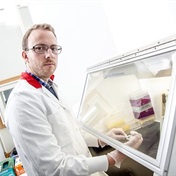Mario Capecchi, 70, Martin Evans, 66, and Oliver Smithies, 82, won the prestigious 10 million Swedish crown ($1.54 million) award for helping forge a new and fundamental branch of medicine - gene targeting.
"Gene targeting in mice has pervaded all fields of biomedicine. Its impact on the understanding of gene function and its benefits to mankind will continue to increase over many years to come," Sweden's Karolinska Institute, said in awarding the prize bearing the name of 19th century dynamite inventor Alfred Nobel.
Mouse models of human disease
Their work led to the development of mouse "models" of human disease and is widely used to study the function of genes in both disease and in normal biology. It is also a basis for gene therapy - correcting faulty genes to treat disease.
The Italian-born Capecchi lived as a street urchin while his mother was imprisoned in the Nazi concentration camp of Dachau during World War II. He became a US citizen, as did the British-born Smithies. Evans is British.
Evans, of Cardiff University, laid the groundwork for making so-called knockout mice when he discovered that days-old embryos are made up of super-powerful cells later dubbed embryonic stem cells. Each one of the cells has the power to give rise to all the cells and tissues in an animal.
Evans and colleagues figured out how to genetically manipulate these cells and implant the embryos back into a female mouse, which gave birth to genetically altered offspring.
Knocking out genes
Capecchi of the Howard Hughes Medical Institute and the University of Utah, and Smithies, now of the University of North Carolina, developed precise methods for changing desired genes one by one. These discoveries led to the development of deleting, or knocking out, genes to discover their function.
"If for example, you see a little finger disappear, then you know that gene is important for making little fingers," Capecchi said in a telephone interview.
In 2001, the trio took the Albert Lasker Award for Basic Medical Research, seen as the US version of the Nobel since many of its recipients have gone on to become Nobel laureates.
Capecchi said he was 3 when his mother was taken to Dachau. "She put me with a peasant family in Italy, because she thought I would be more likely to survive without her," he said.
From the streets
"Then, that money ran out, and I was in the streets from four and a half to age 9," he added.
"I won't tell you how I survived, but I broke a few rules."
After his mother was freed, they moved to the United States, where he began school without knowing any English.
Capecchi said part of his prize money would go toward his team's research into a type of cancer called sarcoma. "What is needed is an understanding of that cancer and each step that gives rise to that cancer. Once you identify those you can make specific drugs that will affect that type of cancer," he said.
Well-earned recognition
The science community said the Nobel marked well-earned recognition of a branch of research that could lead to treatments for illnesses from cancer to cystic fibrosis.
"Gene targeting, a way of altering gene structure and hence function in animals, provides a direct way to investigate the role of particular genes," said Dr Paul Sharpe, Head of Craniofacial Development at King's College London.
"Since the mid 1990s, this was on everybody's list as something that almost certainly had to win a Nobel Prize one day," said Jeremy Berg, director of the US National Institute of General Medical Sciences, which helped fund the work.
Berg said using embryonic stem cells was fundamental to the discovery. Scientists now are working with human embryonic stem cells but the research is controversial because some people oppose the manipulation of human embryos.
President George W. Bush has vetoed two bills that would expand federal funding of such study in the US, although it is actively encouraged in Britain and elsewhere.
Medicine is traditionally the first of the Nobels handed out each year.
The Nobel Laureate for physics will be announced Tuesday, followed by chemistry Wednesday, literature Thursday and the Nobel Peace Prize Friday in Oslo.
The prizes bearing the name of Alfred Nobel were first awarded in 1901 according to the will of the Swedish dynamite millionaire. - (Reuters Health)
Read more:
Genetics Centre
Nobel prize for gene switch
October 2007




 Publications
Publications
 Partners
Partners










